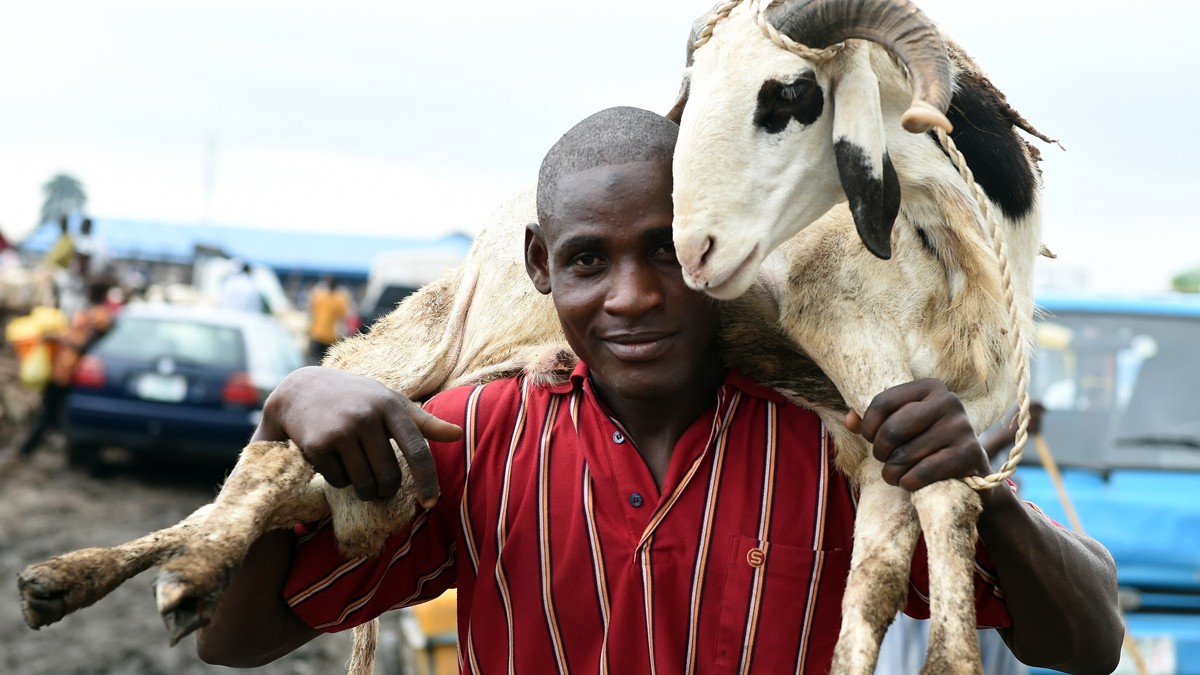Eid el-Adha, ‘Festival of the Sacrifice’, is one of two official holidays celebrated within Islam (the other being Eid el-Fitr or ‘Festival of the Breaking of the Fast’) honouring the willingness of Annabi Ibrahim (AS) to sacrifice his son as an act of obedience to Allah’s command. Before he could sacrifice his son, however, Allah provided a lamb instead. In commemoration, animals are sacrificed ritually. Also called ‘Big Sallah’ in Nigeria, there’s usually an air of happiness and festivity, occasioned by a variety of food in abundance, including fried mutton. In most Muslim households, even those who didn’t slaughter a ram for whatever reason, food is distributed in beautiful containers to family, friends, and neighbours. It is indeed a time of the year to look forward to. But this year, that is not the case, for a variety of reasons.
Prices of commodities at the markets this year have steadily been spiking, recently worsened by the dollar’s rise and the naira’s fall. Since this is a post-Sallah piece, I’ll stick to the season’s essentials: Rams, chickens, tomatoes, pepper, cooking oil, and others all saw prices climbing up so fast and so high that in some cases are double immediate-past prices. Needless to say, this rained on most parades in the country, and even ram sellers via their associations nationwide cried out in the media about low patronage. I heard an anecdote from about three different sources, of a group of Christian clerics in an unnamed part of Kaduna State, who went round markets and pleaded with sellers to be considerate of the Sallah festivities and keep prices reasonably low.
- 2023: Stormy weather in APC over consensus option
- Kano boarding students recount first Sallah ever in school
While probably just a well-meaning urban myth, it still warmed my heart. And even if it is not true, its spread says volumes about a need for a narrative that inspires hope in humanity, because of the general feeling that government isn’t really doing much. I admit that as a cartoonist, I was presented with a dizzying array of ideas in which our collective misfortune is turned into dark humour. Did I succumb? Yes, of course. I’m human, after all.
Many people travel around various states during Sallah, mostly to spend the time with family while taking advantage of public holidays. This year, on my way to visit my mother and siblings, I noticed the roads were ‘dry’. Only a few trucks – and even fewer private cars – shared the highway with me. While that should be a welcome development in the best of times, it was eerie, to say the least, because in the past, the roads are usually packed with travellers. The factors responsible include insecurity à la terrorists that have been laying siege on our roads for some time now, widespread unemployment, and a hard-biting economy among others.
A drive round Kaduna, where I spent Sallah, made me feel guilty for having had such a bountiful, happy celebration with family and friends. The guilt stemmed from the number of beggars at traffic stops in the urban areas, and the sheer multitudes of long-faced people I saw. Like the typical Nigerian I am, I turned to social media for some much-needed escapism. Alas, there was none, because it reflected the harsh realities all around us. Even popular Instagram influencer Laura Ikeji called employers out, that now is the time to increase the salary of their workers, as ‘even little things are now expensive’. Even a smile, that most basic of charities, won’t do anything to uplift the spirits of a low-earning person with mouths to feed, and an ever-dwindling income.
Trust Nigerians and their mob mentality when online: They bashed Ikeji, with one going as far as saying employers aren’t miracle-workers. Another one even jumped to the defense of the Federal Government. Yes, government isn’t in the business of miracles, but what is needed here is not a miracle. Rather, better price control for food, proper monitoring of the ‘mop-up’ system which recently seems to be responsible for shortages, and by extension price hikes. There are many other measures that would help, if only those well-paid ministers and their technocrat aides sit down, huddle, and come up with the right solutions to justify their keep. True, some government agencies I won’t name here are doing some good with some social programmes that are helping out massively, but the truth is that they can’t do everything. There’s far too much slack waiting to be picked up, for God’s sake!
But this isn’t a government-bashing piece, even if it has thus far sounded like one. This is a call to action, based on the most disturbing signal which this season – supposed to be the most bountiful, but has turned out to be the leanest – has projected. I’ve never seen a Sallah, big or small, which had this many people with long faces. While a solution to a problem as massive as what we are currently facing in Nigeria might require a miracle – as impossible as miracles are – maybe the government needs to push a little harder as to meet that seemingly impossible miracle, at least halfway. I sincerely hope you’re one of those who, against all odds, had a happy Sallah.

 Join Daily Trust WhatsApp Community For Quick Access To News and Happenings Around You.
Join Daily Trust WhatsApp Community For Quick Access To News and Happenings Around You.


